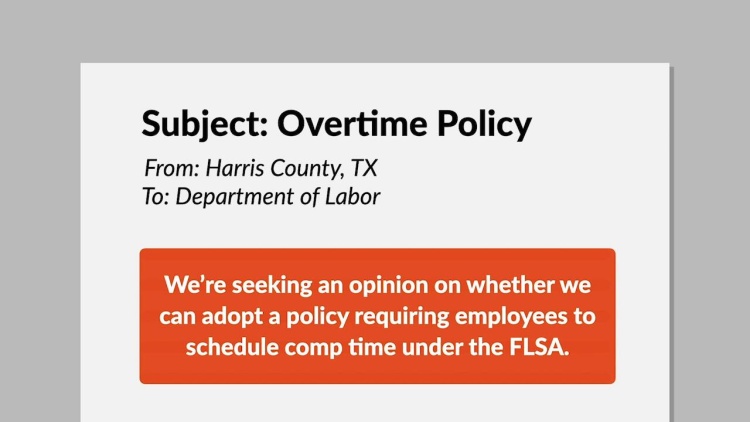Christensen v. Harris County
United States Supreme Court
529 U.S. 576, 120 S. Ct. 1655, 146 L. Ed. 2d 621 (2000)

- Written by Eric Cervone, LLM
Facts
Under the Fair Labor Standards Act (FLSA), government employers are required to offer compensatory time (comp time) to employees who work overtime. The FLSA states that employers must reasonably accommodate employees’ requests to use their accrued comp time. The FLSA also outlines circumstances under which the employers have to compensate employees for accrued comp time. Harris County (defendant) became concerned that it would not be able to afford to compensate all of its employees for their accrued comp time. As a result, Harris County sought to mandate that its employees use their comp time to take time off. Harris County wrote to the United States Department of Labor (DOL) asking if this practice was permitted under the FLSA. The FLSA does not explicitly allow or prohibit employers from requiring that employees use their comp time. DOL staff responded in an opinion letter stating that an employer could compel the use of comp time only if the employee agreed to the practice in advance. Subsequently, Harris County adopted a policy allowing supervisors to mandate that employees approaching a maximum amount of accrued comp time use the time. Christensen and other individuals (the deputy sheriffs) (plaintiffs) were deputy sheriffs in Harris County who were ordered to use their comp time. The deputy sheriffs brought suit, claiming that Harris County’s policy violated the FLSA. The district court granted the deputy sheriffs summary judgment. The United States Court of Appeals for the Fifth Circuit reversed. The United States Supreme Court granted certiorari.
Rule of Law
Issue
Holding and Reasoning (Thomas, J.)
Concurrence (Souter, J.)
Concurrence (Scalia, J.)
Dissent (Breyer, J.)
Dissent (Stevens, J.)
What to do next…
Here's why 907,000 law students have relied on our case briefs:
- Written by law professors and practitioners, not other law students. 47,100 briefs, keyed to 996 casebooks. Top-notch customer support.
- The right amount of information, includes the facts, issues, rule of law, holding and reasoning, and any concurrences and dissents.
- Access in your classes, works on your mobile and tablet. Massive library of related video lessons and high quality multiple-choice questions.
- Easy to use, uniform format for every case brief. Written in plain English, not in legalese. Our briefs summarize and simplify; they don’t just repeat the court’s language.





